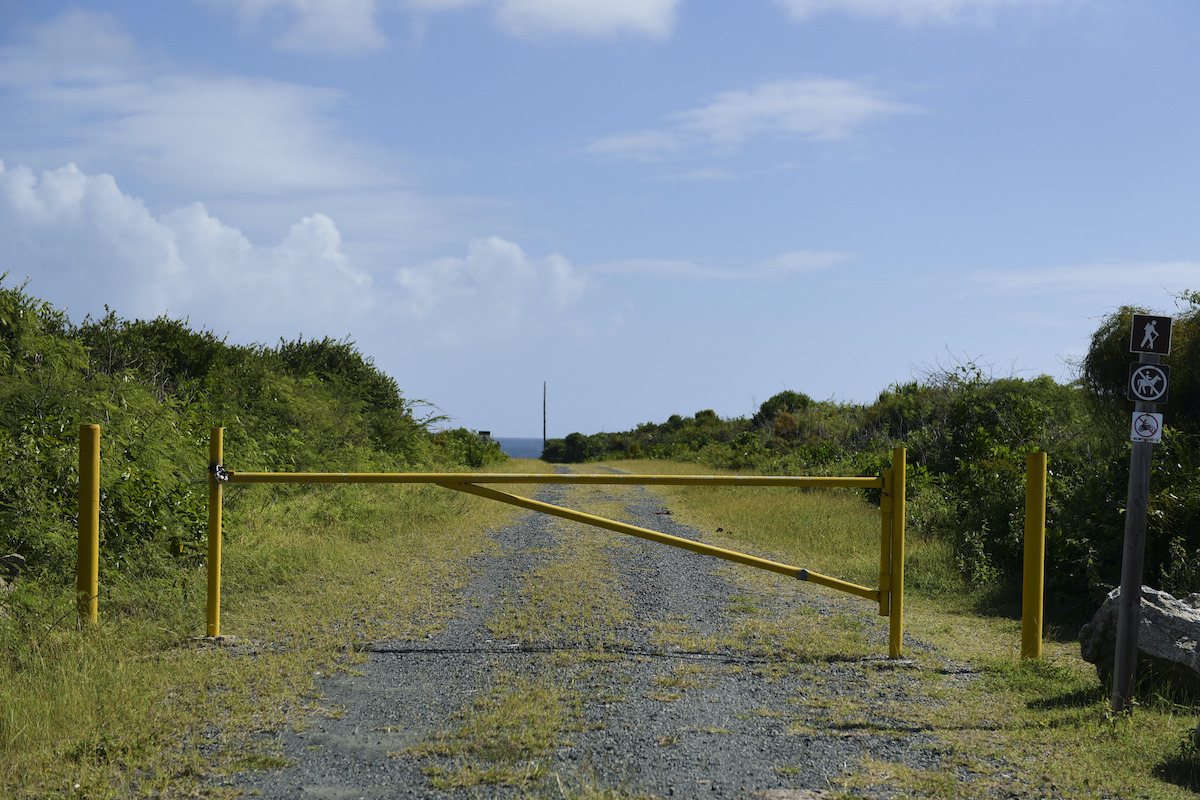

In this Jan. 13, 2017 file photo, a gate stands closed near Ferro Port lighthouse at Verdiales Key point on the south coast of Vieques island, Puerto Rico. The reopening of hiking trails and various white-sand beaches on two tiny Puerto Rican islands long used as Navy bombing ranges and now popular with tourists will be delayed more than a decade, according to a federal report released Friday, March 26, 2021. (AP Photo/Carlos Giusti, File)
By DÁNICA COTO, Associated Press
SAN JUAN, Puerto Rico (AP) — The reopening of hiking trails and various white-sand beaches on two tiny Puerto Rican islands long used as Navy bombing ranges and now popular with tourists will be delayed more than a decade, according to a federal report released Friday.
Cleanup efforts in Vieques and Culebra led respectively by the U.S. Department of Defense and the U.S. Army Corps of Engineers will continue through 2032 at an additional cost of $420 million for a total of $800 million, stated the U.S. Government Accountability Office.
“Substantial work remains,” the report stated. “Challenges include logistics, the islands’ topography and environment, and the safety concerns around handling unexploded munitions. The Navy also faces challenges on Vieques with community distrust of the military handling cleanup efforts.”
So far, crews have removed munition including 32,000 bombs, 12,000 grenades and 1,300 rockets from Vieques, where the U.S. government relocated residents when the Navy began using the island as a training range in the 1940s. Meanwhile, crews have cleared more than 5,000 unexploded ordnances since January 2020 in Culebra, where the military ceased all activities in 1975. An unknown number of munitions remains on both islands located just east of Puerto Rico as teams use tools ranging from machetes to drones to help clean the area.
In addition, the Navy identified perchlorate in the groundwater in at least one site in Vieques, where it operated a training range on 14,500 acres until its closure in 2001. The area was later designated as a Superfund site believed to contain mercury, lead, napalm, depleted uranium and other contaminants.
The GAO said that substantial work remains to be done in one site that covers some 11,500 acres underwater and extends from Vieques’ shoreline to a depth of 10 to 15 feet. Meanwhile, cleanup at 14 of 15 former military sites in Culebra will continue through fiscal year 2031, the agency said.
The report noted, however, that the U.S. Navy expects some 5,000 acres in Vieques might open by 2021 for hiking and other activities.
Overall, the report’s findings are a disappointment to many of those who live in Vieques and Culebra and to Puerto Rico’s government, whose robust tourism sector represents only 7 percent of the U.S. territory’s economy but has remained afloat despite a more than decade-long economic crisis. The beaches that are open in Vieques and Culebra attract tens of thousands of tourists a year, and officials were hoping to increase that number.
According to the GAO report, “(federal) officials told us that the beaches and coastlines present a challenge because some beaches, for example, are open to the public, and closures need to be coordinated with local officials, potentially affecting tourism.”
A couple of locals and tourists have been injured across the years by live munition, including a young girl who was burned after picking up an old shell that contained white phosphorous. Police at the time said officials found six live bombs near the shell.
Another challenge to cleanup efforts is the weather, with officials stating that crews have to sometimes resurvey sites to ensure that a hurricane did not push munitions into a previously cleared site.
The cleanup, in addition to the longtime presence of contaminants on both islands, have angered many locals who blame the U.S. government for their health problems. The Navy has agreed to limit controlled burns to two acres a day, and it expects to start using a closed detonation chamber late this year, something that locals had been requesting for a decade, the GAO said.
The new mayor of Vieques, José Corcino, did not return messages for comment.
The U.S. government has said that past military actions and ongoing cleanup efforts pose no risk, but many have disputed those findings. Last year, the U.S. Environmental Protection Agency awarded a grant to the University of Massachusetts-Boston to launch a three-year assessment of environmental health risks in Vieques.


